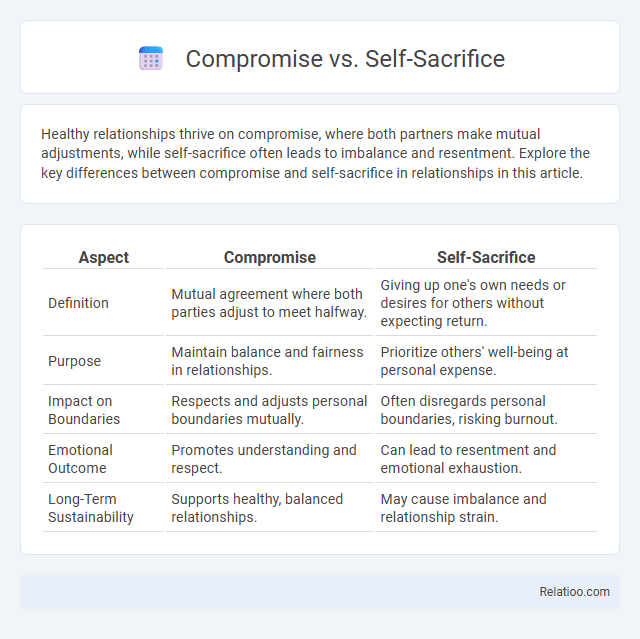Healthy relationships thrive on compromise, where both partners make mutual adjustments, while self-sacrifice often leads to imbalance and resentment. Explore the key differences between compromise and self-sacrifice in relationships in this article.
Table of Comparison
| Aspect | Compromise | Self-Sacrifice |
|---|---|---|
| Definition | Mutual agreement where both parties adjust to meet halfway. | Giving up one's own needs or desires for others without expecting return. |
| Purpose | Maintain balance and fairness in relationships. | Prioritize others' well-being at personal expense. |
| Impact on Boundaries | Respects and adjusts personal boundaries mutually. | Often disregards personal boundaries, risking burnout. |
| Emotional Outcome | Promotes understanding and respect. | Can lead to resentment and emotional exhaustion. |
| Long-Term Sustainability | Supports healthy, balanced relationships. | May cause imbalance and relationship strain. |
Understanding Compromise: Definition and Context
Understanding compromise involves recognizing it as a mutual agreement where both parties make concessions to reach a balanced solution without sacrificing core values. Unlike self-sacrifice, which entails giving up your own needs entirely, compromise requires preserving your interests while adapting to others. In the context of pressure, compromise acts as a strategic response to external demands, enabling you to navigate conflicts constructively.
What Is Self-Sacrifice? Key Principles
Self-sacrifice involves voluntarily giving up personal interests or well-being for the benefit of others, emphasizing altruism and empathy without expecting return. Key principles include prioritizing collective needs, maintaining a balance to avoid self-neglect, and acting from genuine compassion rather than external pressure or obligation. Distinct from compromise and coercion, self-sacrifice requires conscious choice and emotional resilience to support others meaningfully.
Psychological Motivations Behind Compromise
Psychological motivations behind compromise often stem from the desire to maintain relationships, avoid conflict, and achieve mutual benefit, balancing personal needs with others' expectations. Unlike self-sacrifice, which may involve prioritizing others' well-being at the expense of your own, compromise seeks a middle ground that respects both parties' interests. Pressure can distort these motivations, pushing individuals to concede beyond their comfort zones, affecting emotional health and decision-making processes.
The Emotional Impact of Self-Sacrifice
Self-sacrifice often leads to emotional exhaustion and resentment because it involves neglecting Your own needs for the sake of others, unlike compromise which balances interests. Prolonged self-sacrifice can erode self-esteem and create a sense of invisibility, impacting mental well-being severely. Understanding the emotional toll helps in setting boundaries to maintain healthy relationships and personal fulfillment.
Compromise in Relationships: Balancing Needs
Compromise in relationships involves finding a middle ground where both partners' needs and desires are acknowledged and respected, fostering mutual understanding and cooperation. Balancing individual priorities while maintaining open communication helps prevent resentment and promotes emotional intimacy. Effective compromise strengthens trust and creates a foundation for lasting relationship satisfaction.
Self-Sacrifice: When Is It Healthy or Harmful?
Self-sacrifice becomes healthy when it supports your well-being and maintains balanced relationships, allowing you to meet both your needs and those of others without depletion. It turns harmful when it leads to chronic neglect of your own needs, causing emotional burnout, resentment, or loss of identity. Recognizing the fine line between compromise, self-sacrifice, and external pressure is essential to preserving your mental and emotional health.
Compromise vs Self-Sacrifice: Core Differences
Compromise involves mutual concessions where both parties give and take to reach a balanced agreement, promoting fairness and cooperation. Self-sacrifice, however, requires one party to forgo their own needs or desires entirely for the benefit of others, often at a personal cost. The core difference lies in compromise seeking equitable solutions, while self-sacrifice emphasizes altruism and prioritizing others' welfare over self-interest.
Navigating Boundaries: Protecting Self-Worth
Navigating boundaries requires balancing compromise with self-sacrifice and pressure to maintain your self-worth. Recognizing when to say no preserves your mental health and prevents resentment from building. Clear boundaries guard your value while allowing healthy relationships to thrive.
Real-Life Scenarios: Choosing Compromise or Self-Sacrifice
In real-life scenarios, choosing compromise involves finding a middle ground where both parties' needs are acknowledged without one sacrificing core values, often leading to sustainable relationships and mutual respect. Self-sacrifice occurs when an individual prioritizes others' well-being over personal interests, which can be noble but may cause long-term emotional stress or resentment if done excessively. Understanding the difference between healthy compromise and harmful self-sacrifice helps individuals manage relational pressure effectively, promoting balanced decision-making and emotional resilience.
Strategies for Harmonizing Compromise and Self-Care
Balancing compromise and self-sacrifice requires establishing clear personal boundaries and prioritizing your own well-being while navigating relational dynamics. Effective strategies include mindful communication, recognizing when pressure undermines your needs, and practicing assertiveness to maintain harmony without neglecting self-care. Understanding the fine line between accommodating others and preserving your mental and emotional health ensures sustainable relationships and personal fulfillment.

Infographic: Compromise vs Self-Sacrifice
 relatioo.com
relatioo.com